Towards the end of pregnancy, women experience new symptoms that leave them wondering if these are signs of the first stage of labor or just more “end of pregnancy stuff”. Dilation, contractions, plugs of mucus, irritability, back ache, and much more can all be signs of labor! But how can parents know the difference between the signs of labor and normal end of pregnancy symptoms?
Nearing the end of pregnancy can induce feelings of anticipation, anxiety, fear, happiness, dread, hopefulness, excitement and so much more. After experiencing 40 weeks of pregnancy, give or take, a woman knows how to be pregnant. She has been pregnant so long that she forgets what it’s like to NOT be pregnant. Which makes her wonder… will her body really know what to do? Will her body know how to go into labor?
The following is a detailed description of the signs of labor for parents to use as a road map as they walk through the unknowns of childbirth. (But know this, even with map in hand, becoming a parent necessitates stepping into the unknown. Get ready for an adventure!)

Signs of Labor – Is It Baby Time?
One way to look at the onset of labor is by comparing it to becoming sick. Some people become sick quickly – they wake up in the middle of the night, throw up, and immediately feel achey with a fever. It’s obvious that they are sick!
Other may feel sniffly for a day or two, after that a mild sore throat sets in, but it’s not until a few days later that the energy levels drop and bed rest is needed. Looking back, it is easy to see when sickness began. At the beginning, symptoms were so mild it was difficult to determine if it was sickness. It could very well have been allergies! However, a few days in it became obvious it was a virus.
Just like sickness, determining if it’s signs of labor can be obvious or… NOT! Both, and everything in between, is normal! Sometimes the best way to determine if you’re in labor is by hindsight – it’s 20/20!
Early Signs of Labor
The following early signs of labor don’t really mean much in and of themselves. For instance, if you are irritable, are having some braxton hicks contractions, and your back aches, but you experience no other early signs of labor, it likely just means you’re going to have a baby “soon”. Which you already know, right? 😉
However, if you are experiencing a smattering of the following signs of labor, including contractions that are not going away, but getting longer, stronger and closer together, you are likely on your way to having a baby!
Use the following 12 early symptoms and signs of labor to help differentiate between the beginning of labor and normal end of pregnancy symptoms.
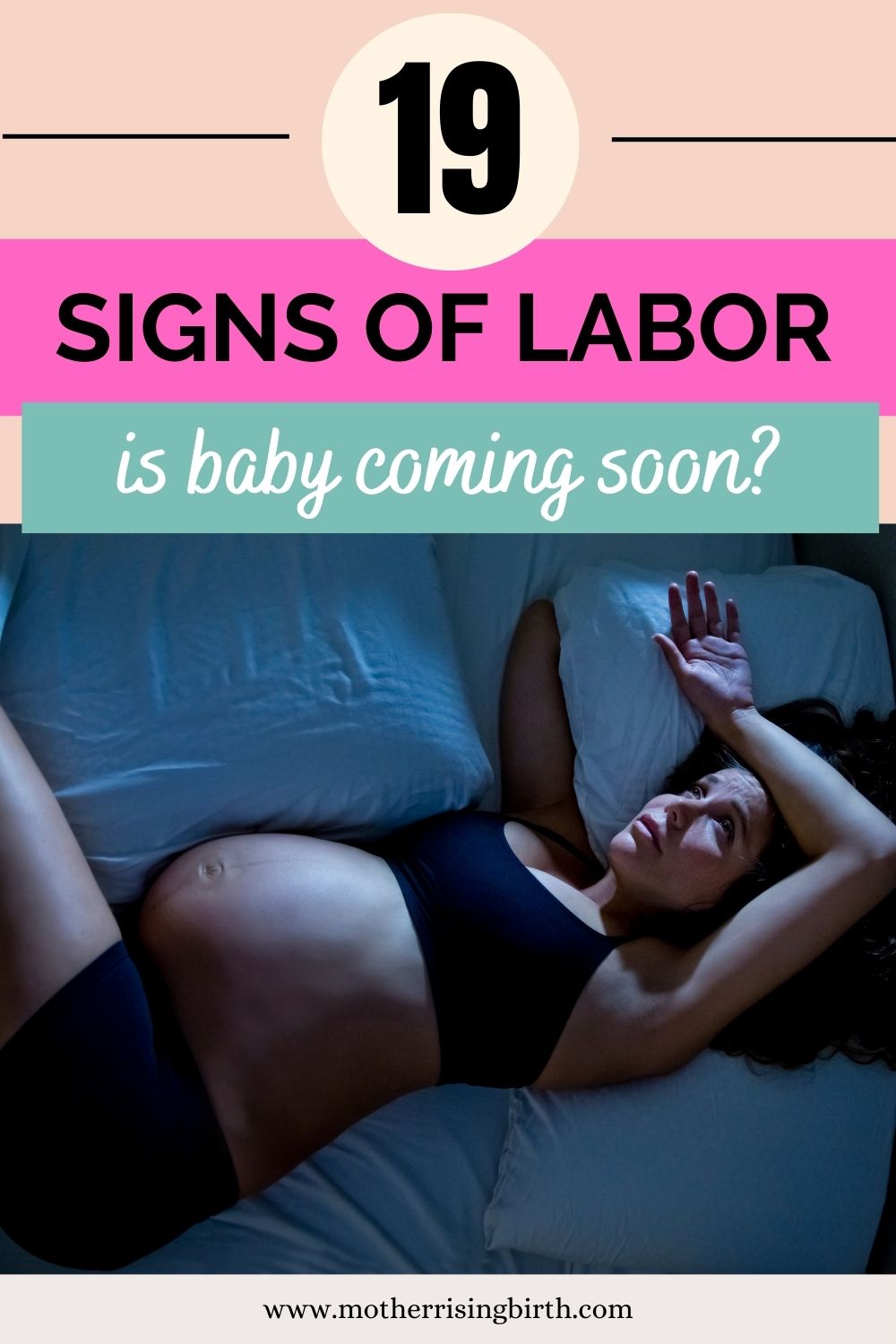
1. Dropping
Dropping, or lightening, is when baby settles lower into the pelvis, getting ready for birth. This is sometimes outwardly noticeable and strangers may even comment, “Any day now! You’re carrying your baby so low!” Let these things roll off your back, you are being initiated into motherhood. 😉
Dropping in and of itself does not mean that you’re in labor, or that labor is imminent, but that labor will be “soon”. Take heart, because dropping can take pressure off your upper digestive tract bringing relief from heartburn and the ability to eat larger meals.
On the other hand, bladder and pelvic pressure is a real thing. Take time to put your feet up – you’ll need it!
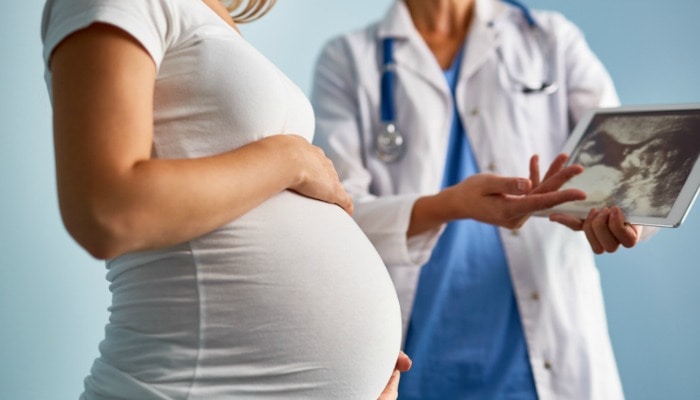
2. Nesting and Restlessness
Some women nest their entire pregnancy, and for some the nesting urge doesn’t kick in until the very end. Those that experience nesting as an early sign of labor will experience an overwhelming urge to clean, organize, or create something. They will feel restless and won’t be able to sit still and “do nothing”.
My mother found herself cleaning the inside of her washer machine. I, on the other hand, tried to keep my home in a constant state of cleanliness. For example, as soon as laundry came out of the dryer I put it away! What a novelty! 😉
3. Irritability
Irritability is another one of the early signs of labor, but obviously in and of itself is not THE sign of labor. For example, if a woman is experiencing regular contractions and is feeling “nesty” but her family is preventing her from cleaning and organizing, she may easily become irritable. She could totally be in early labor!
On the other hand, if she wakes in the middle of the night with irregular, yet strong contractions which end up fizzling out by 6 am, she may feel irritable the next day. She’s not in labor, but it sounds like labor will be “soon”. Maybe she is experiencing prodromal labor?
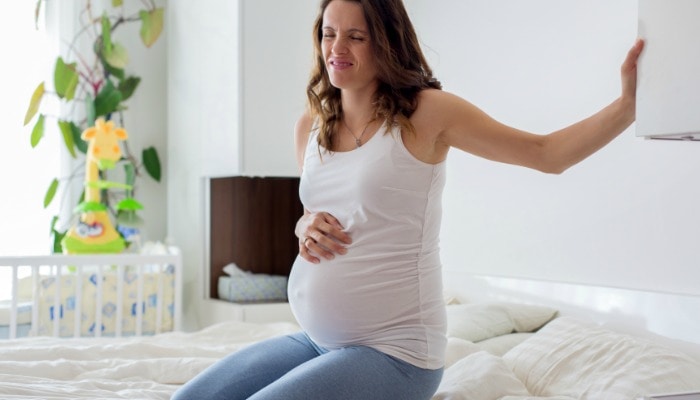
4. Back Ache
Another sign of labor is back ache. At the end of pregnancy with my first child I was experiencing regular, timetable braxton hicks contractions – but they never got stronger, longer or closer together. One night, however, I woke up at 3 am feeling these same contractions but this time they were a little bit stronger and accompanied by a back ache.
Obviously, back ache by itself does not mean labor is happening, but accompanied with other symptoms and signs of labor it just may be the real deal!
For me, back ache coupled with stronger contractions was the beginning of labor (AND back labor). (Make sure to read my post about how to cope with back labor.)
5. Diarrhea
There are many reasons a pregnant woman may experience diarrhea – food poisoning, anxiety, sickness, or labor. A loose stool by itself means nothing, but diarrhea with contractions and bloody show is good reason to think she may be in early labor!

6. A Spidey Sense
Some women, experience “a vague feeling” that labor is imminent. For example, a friend may invite you to get a pedicure and you accept, but deep down you think you won’t make it because you’ll be busy having a baby.
I have no way to throughly describe exactly what this is, but some women “just know” that labor will happen today, tonight, or tomorrow.
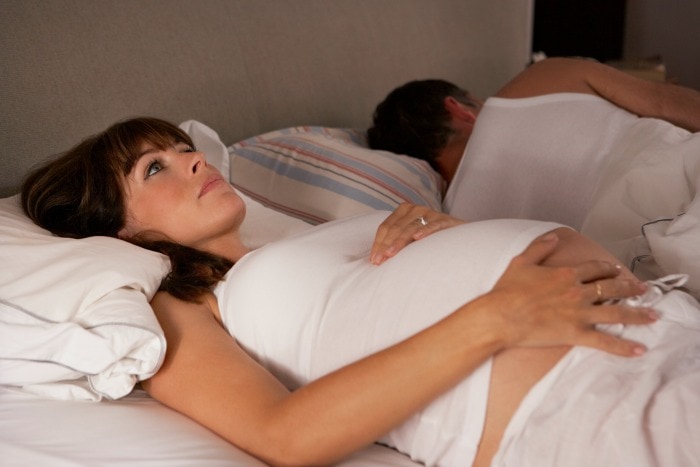
7. Cervical Changes – Dilation
Another sign of labor is cervical change. The cervix is simply the opening of the uterus, where the baby comes through. During pregnancy this opening is closed (not dilated), thick (not effaced), and pointing towards the mother’s back (posterior). And as an extra layer of protection for baby is a plug of mucus in the cervix called the mucus plug.
In labor the cervix opens to 10 cm, but dilation often begins before labor. It is not unheard of to be 3-4 cm dilated before labor!
However, some mothers-to-be are shocked to learn that dilation in and of itself does not predict labor, but simply means birth will happen “soon”. Always remember, the vagina is not a crystal ball!
8. Cervical Changes – Effacement
Another thing the cervix does before and during labor is that it thins out or effaces. During pregnancy it is thick and hard like the tip of the nose, but as pregnancy and labor progresses it softens and becomes paper thin.
Much of early labor is devoted to the effacement of the cervix!
9. Cervical Changes – Cervical Movement
A less popular sign of labor, is when the cervix moves from a posterior position to an anterior position. Instead of being closed, thick, and facing the back of the woman, the cervix shifts to an open, soft, and forward facing position.
Just like effacement, much of early labor is devoted to the cervix moving forward.
10. Cervical Changes – Mucus Plug and Bloody Show
Sometimes when the cervix is opening (dilating), softening (effacing), and moving forward (anterior) a woman may see light spotting and/or bloody mucus aka the mucus plug in her panties or when she wipes after using the toilet. This is normal and surprisingly, does not mean that labor is imminent. It just means that you will be having a baby “soon”.
However, bloody show in combination with some of the symptoms listed above, and contractions that progressively become stronger, longer and closer together is a definite sign of labor.
Wondering what a mucus plug looks like? Head on over here to see lots of photos about mucus plugs with explanations!
11. Contractions
Another one of the more obvious signs of labor are contractions that become stronger, longer, and closer together. However, as black and white as that may seem, it can still be difficult to differentiate between real labor contractions and braxton hicks contractions.
First, let’s talk about braxton hicks contractions. What do Braxton Hicks feel like?
Braxton Hicks Contractions Symptoms
- Make the belly is hard as a rock… think abs of steel
- Can be painless and happen without awareness
- Or uncomfortable with lots of pressure
- Typically only on one side of the belly
- Not usually coupled with back pain
- Doesn’t increase in strength and intensity… they’re just annoying
- Can be caused by dehydration. After drinking water and resting, braxton hicks contractions will usually go away.
- Can be caused by fetal movement…
- and by movement of the mother
- Can also be caused by going to the bathroom or having sex

Labor Contractions Symptoms
On the other hand, real labor contractions feel like they…
- Radiate throughout the entire belly
- May be accompanied by back pain
- Get longer over time
- Become stronger over time
- Get closer together over time
- Are timeable
- Don’t go away after drinking water, taking a shower, bath or taking a walk. In fact, they may even get even stronger, longer, and closer together.
- Can also be triggered by moving, going to the bathroom, fetal movement, or having sex.
If you are having contractions that are progressively getting stronger, longer, and closer together you are likely in labor and may need to go to the hospital! (Make sure to check out my post about how to cope through active labor and when to go to the hospital!)

12. Water Breaking
Another one of the more obvious signs of labor is when the water breaks . Water breaking happens when the amniotic sac of fluid surrounding the baby tears and a leak or gush of fluid comes out of the vagina.
Since most new parents have never experienced this before, when her water breaks it’s common for her brain to compare it to what she already knows. She knows what it feels like to pee. She also knows what it’s like when her period starts. As quickly as those thoughts come, right behind it is the new realization that this is something different. What she is feeling is her water breaking.
However, simply because the amniotic sac has been ruptured it doesn’t necessarily mean labor is happening, it just means that the birth of your baby is eminent. Around 10-15% of women experience the water breaking before labor. For most women this happens during labor during transition. Sometimes baby is born in the amniotic sac!
Once the water has been broken it is important to communicate with care providers to determine the best next step. Some care providers want women to come to the hospital right away because labor may need to be induced or augmented to keep labor safe for mother and baby. Others may be open to laboring at home for awhile.
- Keep communicating with care providers! It’s important to keep the lines of communication open and brainstorm all possible solutions.
- Determine if there are any alternatives that could be tried first since some natural methods of induction are more gentle than others.
What Happens During Labor?
Need more information? Check out the Doula’s Guide to the Stages of Labor for what to expect during each stage of labor and how to cope through it all.
Signs of Labor – Is It Baby Time?
Just to recap, if you are experiencing the following signs of labor it just might mean that you’re in early or active labor!
- Dropping
- Nesting and Restlessness
- Irritability
- Back Ache
- Diarrhea
- A Spidey Sense
- Dilation
- Effacement
- Cervical Movement
- Bloody Show or Mucus Plug
- Contractions that become stronger, longer and closer together
- Water Breaking




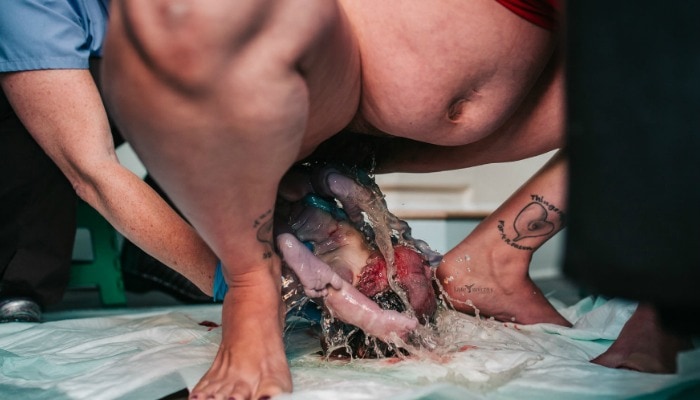

Rebeca Almendarez
Sunday 6th of August 2023
Good evening I’m going on baby number 7 and still cannot tell if I’m in real labor I’m 34 weeks in so much pain lower back and feel like contractions, nausea, woken up not able to breathe because i feel congested or something like it, I also have so much loose stool. But this article is very interesting and helpful. Thank you.
Liina
Saturday 27th of March 2021
Thanks for the nice compilation!
I was wondering if lactation could be considered as one sign of labour drawing closer?
Lindsey VanAlstyne
Wednesday 31st of March 2021
I'm not sure! :)
Lizzy
Wednesday 13th of November 2019
Hi Am 40.2wks I feel my baby kicks frequently and am alwys contracting this makes me restless and anxious. Sometimes I feel the heaviness at the lower part of my stomach as if hes going to pop out any min. I cnt sleep much @nights and I drink alot of water alwys, regular pee, backaches and hiccups
Krysti
Wednesday 17th of July 2019
I am currently 34+1, baby girl has dropped, bowels have changed, insane low pelvic pressure, appetite has changed, I'm no longer sleeping well, I'm exhausted but want to clean everything. My gut is telling me that she will be here by the end of the month, somewhere around the 30th of July (I'll be 36w on July 30th).
Thoughts?!
Magen
Wednesday 10th of July 2019
I'm 35 weeks and 3 days. My baby girl is breach. I wish I could get her to move head down. The doctors said she is to big to move. That makes me more mad. I have found myself mad at the world. Everything is getting on my nerves. I have lost my plug two weeks ago. I have already dropped and went through nesting but it seems like I'm not going to have my baby any time soon. Is this normal? I can't sleep at night. I am never tired. I am always so thirsty and never hungry. I am just so tired of being pregnant. Thank you so much.
Krysti
Wednesday 17th of July 2019
Try putting a warm compress on your lower abdomen (closer to your pubic bone) and a cold compress at the top of the uterus. It's said that baby's head gravitates towards the warm and away from the cold and has help baby get into position. Also, look online for way to get baby to turn naturally...There are a couple things that I know have worked for friends and family of mine.
Lindsey
Monday 15th of July 2019
Hey girl, thanks for commenting. Some of what you wrote about, sounds really normal unfortunately. I hope your baby turns and you get some sleep. Not sleeping is awful